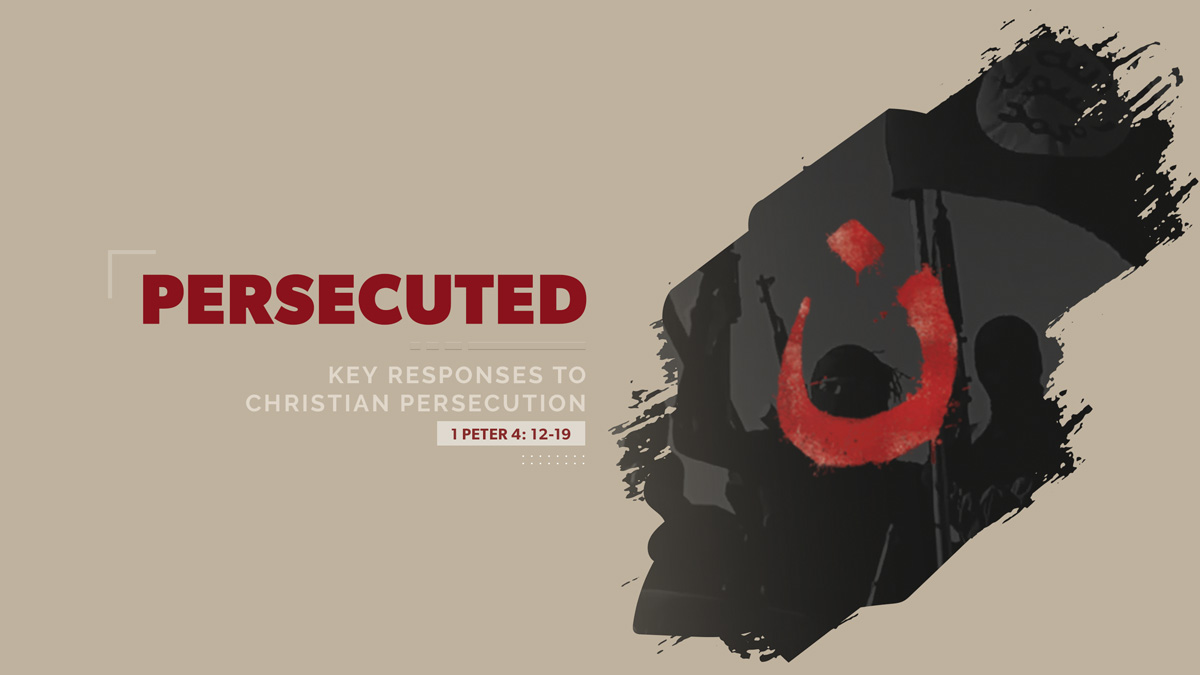No one wants to suffer, especially when doing what is right. However, in this fallen world, suffering for being a Christian is unavoidable. All who delight in pursuing righteousness and are determined to live godly in Christ Jesus will be hunted and persecuted because of their faith (2 Tim 3:12).
“Persecution is simply the clash between two irreconcilable value systems” (John Stott). In the world in which we live, there are two value systems, the Biblical view and the non-Biblical worldview. These two systems are at odds with each other and irreconcilable. There is an ongoing clash between those who believe, trust, and love God and those who don’t and oppose Christ. There is a war waged between God’s truth and Satan. Satan rages in the hearts of the men and stirs them up to rebel against that which is good. In his first letter chapter 4, Peter gives words of encouragement and direction to the believers under severe persecution.
SIX key responses to Christian persecution (1 Peter 4:12-19)
Expect it (v12)
Peter has consistently through this epistle said that persecution of the Christian in various forms is inevitable. In fact, the surprise would be if it didn’t come. When a Christian lives in an ungodly culture unwelcoming consequences are guaranteed. Godliness, goodness, justice, and truth become offensive to the wicked. Gospel proclamation and confronting sin will be received with violence. Basically, Christians become a threat to the evil society and Satan’s administration. Satan hates Christ and Christians, and he will do whatever to get rid of Christians.
There is a great cost to being a Christian. There is a definite price to pay to carry Christ’s name. Jesus said if anyone would want to follow Him, he must deny himself and take up his cross daily (Luke 9:23). The Cross signifies pain, suffering, rejection, persecution, and even death. Christians should not be disheartened or cast doubt on God’s love for them in the middle of their suffering. Satan is looking for these opportunities and waiting to deceive believers, putting doubts in their minds, as he did in the garden, making them question the love of God. God allows fiery trials to test the genuineness of the faith.
Rejoice in it (v13)
Peter is re-iterating what Jesus told in the sermon on the mount (Matthew 5:10). The motivation for the believer who is suffering for the sake of Christ doing what is right is the glory awaiting for him in heaven. Jesus walked the path to victory, which was the path of suffering. When you share the same kind of suffering Jesus experienced (not in the sense of atoning suffering) you’re promised the same victories that Christ achieved. And Peter says to keep rejoicing in your suffering for your joy will be exceedingly greater at His second appearing (the revelation of his glory). Your eternal reward of great joy is correlated to your suffering. If you’re a faithful Christian who contends for the truth without any compromise you’re guaranteed to suffer more. Because naturally, the world hates Christ and Christians. The more your suffering the more your eternal reward of joy going to be. If you’re a secret Christian the chances are you encounter less persecution. Your eternal reward of joy will be reflective of your earthly suffering.
Blessed by it (v14)
Not only the eternal reward but also you will be blessed on this earth when you’re persecuted for proclaiming Christ. The promise of God for the Christians who stand boldly and forcefully for Christ is this: “If you are reviled for the name of Christ, you are blessed because the Spirit of glory and God rests on you.” Peter says, God promises His presence and the power upon them. This is the power and enabling that early Christians had when they were torched alive, thrown to wild beasts, imprisoned, racked, seared, broiled, scourged, stoned, and hanged. Throughout the church’s history, literally thousands and thousands of Christians were martyred for fighting for their faith.
Even right now, we read countless reports of Christians being persecuted, tortured, and killed for their faith and propagation of Christ in countries like North Korea, China, Afghanistan, Somalia, Libya, Pakistan, Sudan, Eritrea, Yemen, Iran, India, and Nigeria. Some of you may have even seen those gross videos of Christians being beheaded by those Islamic extremists. I haven’t heard any report of any Christian martyr who died screaming and denouncing what he believed.
How do you explain the courage and boldness of people who embark on mission trips to those Islamic and communist countries to propagate the Christian gospel knowing very well that this can be their final flight? These people are not fanatics. Where on earth do they get this courage? What kind of hope motivates their action? I believe that there is some special divine intervention of the Spirit of God in the life of a true believer in a crisis. There is something that God does to a believer in the face of persecution, that grants him the supernatural ability to die willingly giving glory to God.
Evaluate it (v15-16)
When you suffer make sure that your suffering is not the result of your evil behavior. If you suffer as a murderer, a thief, an evildoer, or a meddler then you’re receiving the due punishment for your wickedness. You should be ashamed of that. But, if you’re suffering as a faithful Christian you don’t have to be ashamed of that, for your manner of living glorifies God. So, praise God for the privilege you have sharing Christ’s life.
Refined by it (v17-18)
Commit yourself to God (v19)
The ever-present danger of Christian persecution helped to keep believers close to the Lord and one another, to keep their distance from worldly pleasures, and to weed out those who were not serious about following Christ. We need to be prepared for whatever may come for we do not know the time or manner of our death.

Leave A Comment